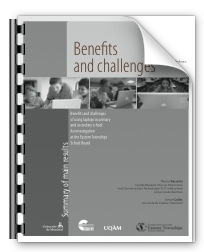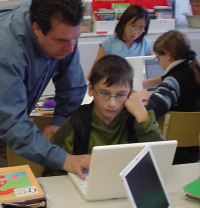Excerpt from Benefits and challenges of using laptops in primary and secondary school: An investigation at the Eastern Townships School Board. Summary of main results, by Karsenti, T., & Collin, S. (2011). Montreal, QC: CRIFPE.
This project was the fruit of an exemplary research partnership between the Canada Research Chair on Information and Communication Technologies (ICT) in Education and the Eastern Townships School Board. The school board, under the urging of its visionary Director General Ron Canuel, had already determined eight years previously to provide most of its students with laptops to use for their schoolwork.
In this study, which is still ongoing, we aimed to identify the main benefits and challenges of using laptops in primary and secondary school. We administered a large-scale survey questionnaire to students, teachers and other education stakeholders. We also conducted individual and group interviews and performed classroom observations (currently under analysis). In all, 2,432 students and some 280 teachers and other education stakeholders participated in the first study phase.
The data gathered to date have enabled us to determine the state of technology access, both at school and at home. We also identified the computer equipment owned by teachers and students at the Eastern Townships School Board. In addition, the survey revealed the pedagogical uses of technologies by teachers and students. We also identified the technological skills of the teachers and students. Most importantly, the gathered data enabled us to identify the main impacts, including the benefits and challenges, of the use of ICT by teachers and students at the Eastern Townships School Board.
Challenges
We grouped the challenges of using laptops into two general categories: technical and pedagogical.
The technical challenges appeared to be more problematic, and were most probably related to the intensive use of information and communication technologies for pedagogical purposes (Karsenti & Collin, 2011). The pedagogical challenges were of various types: some Websites and pedagogical activities that were suitable for ICT use were not very appealing or stimulating for the students, so that they were tempted to use their laptops for fun instead of learning. In this case, ICT can become a source of distraction rather than a tool to encourage learning.
The teachers found that the pedagogical challenges were mostly related to the ongoing training they received. The training did not seem to meet their needs, which are quite different from those of their students.
Finally, the students, like their teachers, appear to have developed a strongly educational perception of the use of laptops in class. In tangible terms, many students clearly stated that recreational use instead of pedagogical use of their laptops in school would be a waste of time. This 'techno-educative maturity' of the students is an unexpected finding, and could be at least partly explained by the frequency and duration of use of laptops in class.
Benefits
The benefits identified in this first study phase may be grouped into four main categories, as follows:
- Schoolwork facilitation and improvement;
- Psychosocial factors for students' academic success (motivation, autonomy, interaction and attention);
- Access to information, learning and skills development;
- Equity, openness to the world, and opportunities for the future.
A total of 12 main benefits of using laptops were identified by the majority of the students and teachers:
- Facilitation of schoolwork for students and teachers, and consequently time saving;
- Increased access to current, high-quality information;
- Greater student motivation;
- Improved student attentiveness;
- Development of student autonomy; 6. Increased interaction between students and between students and their teacher;
- Individualized, differentiated learning;
- Active, interactive and meaningful learning with multimedia support;
- Development of ICT skills;
- Universal access;
- Breakdown of the barriers between the school and society;
- More opportunities for the future.
These benefits, which were mentioned by the vast majority of the respondents, clearly demonstrate that the use of laptops, or the intensive use of information and communication technologies, has a major impact on students' academic success, and potentially on their future academic and socio-professional careers.
Unexpected Benefits
A further, particularly interesting finding of this study is the attitude of teachers towards technologies. In fact, the literature on the pedagogical integration of ICT frequently reports that ICT are motivating for students, but are perceived more negatively by teachers, for instance, due to the changes in teaching practices that they imply.
It is therefore particularly unusual to find so few teachers with a negative attitude toward technologies. Less than 5% of the teachers at the Eastern Townships School Board were unenthusiastic about using them. The majority, even though they had experienced a few problems, would not go back to their old ways of teaching. Indeed, for both teachers and students, the worst use of the new technologies would be not to use them in class.
Another notable impact was revealed by the results of this study: the 'one laptop per child' strategy appears to have contributed to the development of ICT skills in both students and teachers, particularly information literacy skills. As noted by Karsenti and Dumouchel (2011), technologies have wrought substantial changes in information production and accessibility (see UNESCO, 2005).
In today's knowledge society, the primary advantage of ICT is to provide rapid, easy and free access to practically unlimited amounts of information. ICT have become a prerequisite, a mandatory way to access information and consequently produce knowledge and foster learning. We may therefore conclude that the teachers and other education stakeholders at the Eastern Townships School Board have pioneered an exemplary approach and made an outstanding contribution.
Impact
In light of the results of this preliminary study, we may posit that the implementation of 'one laptop per child' strategy at the Eastern Townships School Board is a primary factor to explain its leap from 66th position in 2003 to 23rd in 2010 (out of 70 school boards), and why the student dropout rate has plunged from 39.4% in 2004-2005 to 22.7% in 2008-2009.
This progress, which we may at least partly attribute to the 'one laptop per child' strategy, would certainly never have been possible without the complete commitment and outstanding skills of the teachers, the school administrations and other education stakeholders at the Eastern Townships School Board.
The official statistics on student graduations in this school board appear consistent with the preliminary results of this study, which enable us to gain a broad overview of the benefits and challenges of using laptops in the classroom. In this respect, we should retain the lesson that, despite the technical and pedagogical challenges, this innovative education initiative represents above all a gain, for both teaching and learning, and for the future social and professional lives of the students who participated.
Directions for future research
At this point (the research is still ongoing), it is difficult to point out directions for future research. Nevertheless, the findings of this first study phase suggest the following scientific approaches:





Glad to see this report, but it's unfortunately very vague in key details of what the implementation was. What kinds of computers were given out? (From what somebody told me previously, there were not XOs nor was this part of the OLPC program.). What percent of the students received individual laptops and what percent accessed computers through mobile labs? Were students allowed to take the laptops home? Who was responsible for maintaining or repairing them? Were there other aspects of the intervention (teacher training, increase in Internet access, use of a particular curriculum)? What was the funding source? The report pretty much goes straight to the findings without explaining what the intervention was that is being investigated.
HI Mark,
I believe that I can answer many of your questions.
What kinds of computers were given out?
Answer: Starting in 2003, there was no OLPC or XO's, so we used Apple G3's/G4s and then in 2006, used Macbooks.
What percent of the students received individual laptops and what percent accessed computers through mobile labs?
Answer: Over a three-year period of time, we deployed a laptop computer to ALL students from Grades 3 to Grade 11 (last year of high school in Quebec). All teachers/administrators/non teaching professionals/special education technicians were also given a laptop, free of charge for all. Students in Kindergarten, Grades 1-2 received mobile labs.
Were students allowed to take the laptops home?
Answer: Absolutely, every child was encouraged to bring them home as well. At that time over 30% of these students did not have internet access at home, or at best, a slow modem. The end result was that the students and related families spent an increasing amount of time at the school or near, to access the wireless high speed environment. We also have no filters on our systems, since they simply don't work and present a false sense of "security".
Who was responsible for maintaining or repairing them?
Answer: The School Board assumed the costs unless it was proven that a repair was due to negligence on behalf of the student. At the end of each school year, the laptops were re-imaged and returned to the individuals by early-mid September. The teachers had them returned by the end of June.
Were there other aspects of the intervention (teacher training, increase in Internet access, use of a particular curriculum)?
Answer: As a School Board, we knew that the provision of professional development was crucial and in the first three years of the deployment, we had incorporated about 225 days for such training, including technological and pedagogical applications. The curriculum being used was socio-constructivist in nature, therefore inquiry-based instruction represented a fundamental classroom approach. As is typical in any educational setting, such new approaches take time to become entrenched in practice and beliefs.
Also, the research mentions the professional development context however keep in mind that such commentary is the norm, for any initiatives undertaken by School Boards or Education Ministeries/Departments. We can always do a better job of professional development.
What was the funding source?
Answer: The Eastern Townships School Board is located about 80 miles east of Montreal and covers a territory the size of Maryland. The infrastructure challenges were imposing, as well as ensuring financial support. The government of Quebec gave us the go ahead to secure bank loans and with the presence of a foundation, this represented the major funding source, that is, no outside help of any real substance. The School Board incurred a deficit of about $15 million, and as of last year, that deficit had been reduced to less than $5 million, without a single cut or reduction in services or programs in the schools.
On the School Board's website (www.etsb.qc.ca), there is more information regarding the context, conditions and on-going challenges that were faced. In my estimation, this initiative remains one of Canada's best kept secrets. Also, interestingly enough, the premier of the province announced three weeks ago that every teacher in the province would be receiving a laptop, approximately 3 weeks after the release of this research.
Hope this helps,
Ron Canuel
Thank you very much!! Very helpful and interesting.
HI Mark,
I am now the CEO for the Canadian Education Association and have undertaken the role of supporting innovation in classrooms across Canada. One important research that our organization conducted and is on-going, is called What Did You Do In School Today? This research, including the feedback of over 62,000 students in classrooms across Canada looks at the critical issue of Intellectual Engagement. Not surprising, we have discovered that in spite of students achieving high grades in standardized tests and the equivalent, the level of intellectual engagement is quite low, approximately 37%. I strongly suggest that you and your colleagues take a few minutes to go on our website www.cea-ace.ca to read the report. There will be a second research from more data received, that includes a wider range of information on how students suggest to improve their levels of intellectual engagement. Thanks for your interest,
Ron
Like other 1:1 laptop programs (such as MLTI in Maine), hopefully follow-up and continued reporting will cover the deployment aspects in more detail so that cause and effect can be researched in depth.
Future studies beyond laptops/netbooks
I envision that as tablets become even more popular on campuses, we'll begin to see interaction where both a laptop and tablet are used in tandem. My son does much of his high school chemistry work on a laptop for report generation in his lab work while using an iPad at the same time to reference a highly interactive periodic table of elements.
How will we measure the impact of digital textbooks and personalized courseware on learning outcomes? The next frontier for research no doubt.
Scott,
I'm interesting in hearing more about the high school environment your son is in where both laptops and iPads are available. Public or private school? Supplied by school or family? One-to-one, mobile cart, a few in the class?
I agree that there are some advantages to having both, but that's a luxury few schools have.